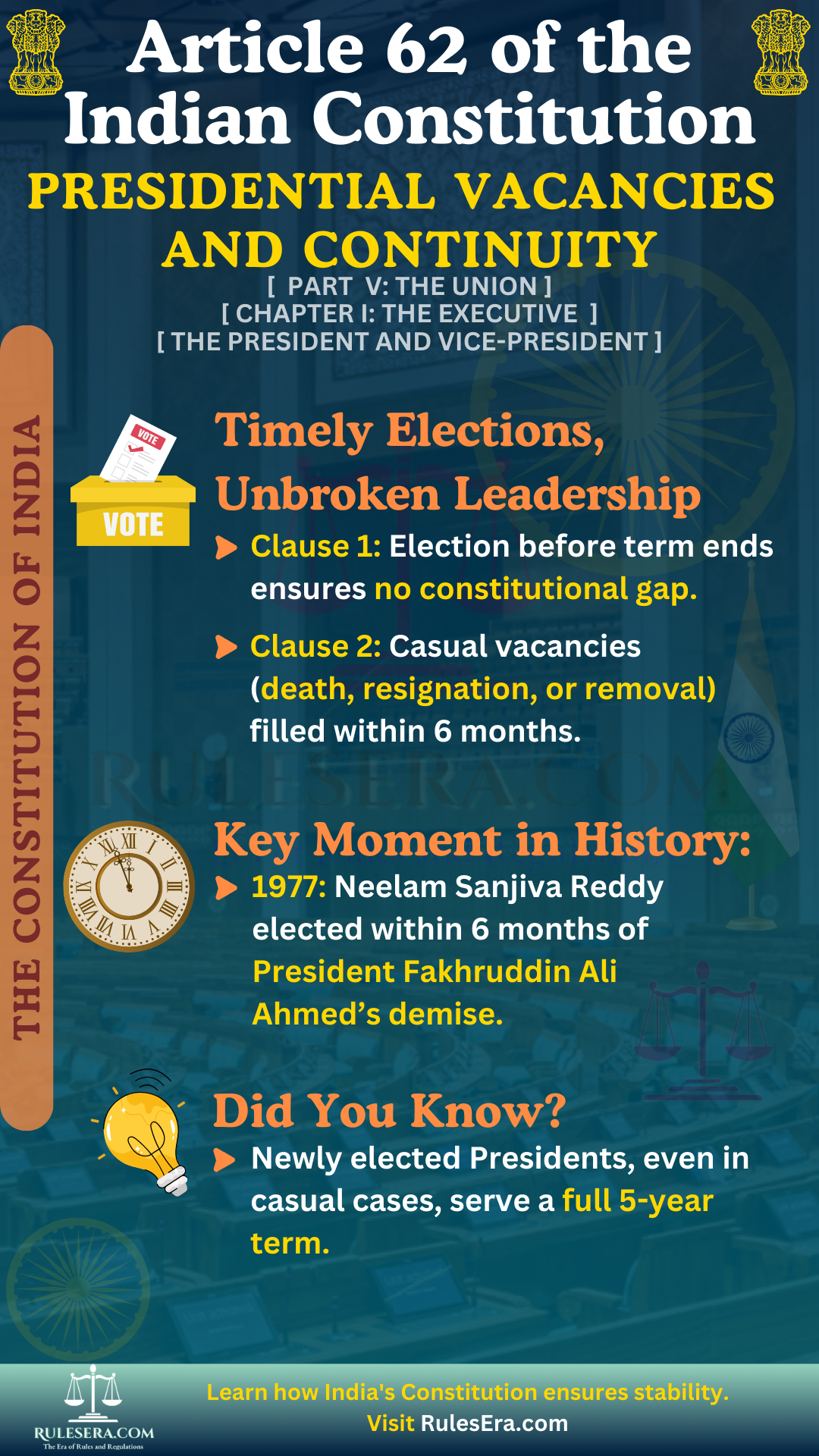Part V: The Union
Chapter I: The Executive
Article 62: Time of Holding Election to Fill Vacancy in the Office of President

--- Original Article ---
(1) An election to fill a vacancy caused by the expiration of the term of office of President shall be completed before the expiration of the term.
(2) An election to fill a vacancy in the office of President occurring by reason of his death, resignation or removal, or otherwise shall be held as soon as possible after, and in no case later than six months from, the date of occurrence of the vacancy; and the person elected to fill the vacancy shall, subject to the provisions of article 56, be entitled to hold office for the full term of five years from the date on which he enters upon his office.
Explanation
Article 62 of the Constitution of India addresses the timing of elections to fill vacancies in the office of the President. It ensures that the office of the President is never vacant for long periods and establishes clear rules for both regular and casual vacancies. This article safeguards the continuity of the highest constitutional office in India.
Key Provisions
- Clause (1): Elections to fill a vacancy caused by the expiration of the President's term must be completed before the expiration date. This ensures that the office is not left vacant, allowing a smooth transition.
- Clause (2): If a casual vacancy occurs (due to death, resignation, or removal), an election must be held as soon as possible and within six months. The elected President holds office for a full five-year term.
Amendments and Real-Life Examples
- Amendments: Article 62 has not been amended, reflecting the foresight of the framers in ensuring a clear and effective process for filling vacancies in the office of President.
- Real-Life Example: In 1977, following the sudden death of President Fakhruddin Ali Ahmed, Neelam Sanjiva Reddy was elected within the stipulated six-month period and served a full five-year term, as outlined in Article 62.
Historical Significance
This article reflects the framers' emphasis on continuity in the office of the President. By requiring prompt elections in case of vacancies, Article 62 ensures that the constitutional head of the country remains active, preserving the stability of India's democratic institutions.
Legislative History
Article 62, originally presented as Article 51 in the Draft Constitution, was debated extensively in the Constituent Assembly before being adopted into the Constitution on December 28, 1948.
Debates and Deliberations
During the Constituent Assembly debate, Mr. Mohd. Tahir proposed reducing the time frame for holding an election to fill a presidential vacancy from six months to three months, arguing that quicker action was necessary for such a significant constitutional office. However, this suggestion was not accepted.
Tahir also suggested that if a President vacated office after serving two years due to removal or resignation, the newly elected President should serve only the remainder of the original term. He argued that aligning the term of the President with that of Parliament would ensure greater consistency in governance. This proposal was rejected.
Prof. K.T. Shah further proposed that the Vice-President should automatically assume the role of Acting President in case of a vacancy, instead of holding a new election immediately. He argued that the Vice-President's experience would ensure continuity and stability during emergencies. Dr. B.R. Ambedkar rejected this amendment, stating that the Constitution already provided the Vice-President with the power to assume the President's duties temporarily, and further provisions were unnecessary.
After extensive deliberation, Article 62 was adopted in its original form, with the six-month period for holding an election to fill a casual vacancy.
Frequently Asked Questions (FAQs):
As per Article 62, an election to fill the vacancy must be completed before the expiration of the current President's term, ensuring a smooth transition.
In the event of a casual vacancy (due to death, resignation, or removal), an election must be held as soon as possible and no later than six months from the date of the vacancy.
Yes, the person elected to fill a casual vacancy is entitled to hold office for a full five-year term, starting from the day they enter office, as per Article 62.